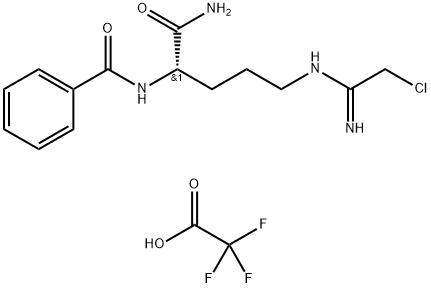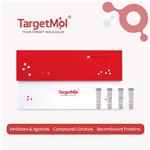cl-amidine is a pad4 deimination activity inhibitor.protein arginine deiminase 4 (pad4) can catalyze the post-translational modification of arginine residues on histones to form citrulline, which can change gene expression. thus, dysregulated pad4 activity has been implicated in cancer and rheumatoid arthritis.
previous study found that cl-amidine antagonized the pad4-mediated enhancement of the the p300gbd-grip1 interaction dose-dependently, and it was noteworthy that cl-amidine treatment had only a minimal reduction in the efficiency of the interaction in cys645s-transfected cells, thereby suggesting that the inhibitory effect of cl-amidine was not a nonspecific one but was targeted at the active pad4 enzyme. these results demonstrated that cl-amidine was significantly more potent than f-amidine, consistent with its improved in vitro potency [1].
animal study showed that cl-amidine could improve survival in a mouse model of cecal ligation and puncture (clp)-induced septic shock. cl-amidine was proven to play protective roles by restoring innate immune cells in bm, decreasing bm and thymus atrophy, increasing blood monocytes and blood/liver bacteria clearance, and attenuating pro-inflammatory cytokine production in a murine lethal sepsis model [2].
| Target | Value |
PAD1
(Cell-free assay) | 0.8 μM |
PAD4
(Cell-free assay) | 5.9 μM |
< td style="border-bottom: 1px dotted #ccc;padding: 5px;"> PAD3
(Cell-free assay) 6.2 μM |
[1] luo, y. ,arita, k.,bhatia, m., et al. inhibitors and inactivators of protein arginine deiminase 4: functional and structural characterization. biochemistry 45(39), 11727-11736 (2006).
[2] zhao t, pan b, alam hb, liu b, bronson rt, deng q, wu e, li y. protective effect of cl-amidine against clp-induced lethal septic shock in mice. sci rep. 2016 nov 7;6:36696.

